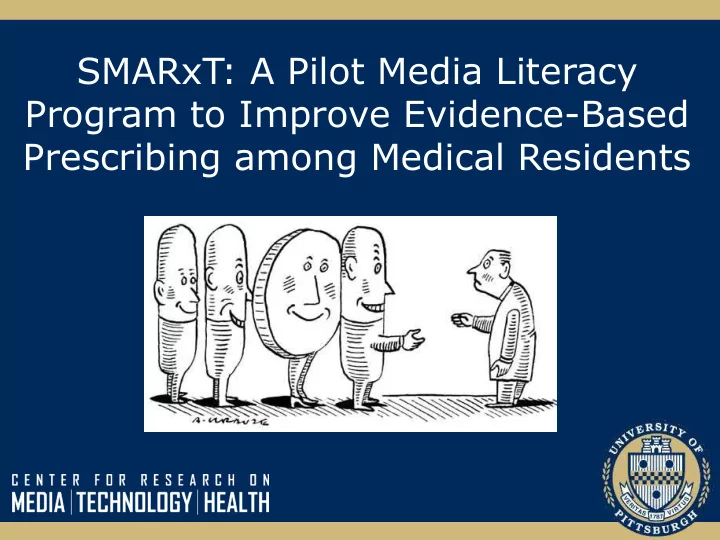

SMARxT: A Pilot Media Literacy Program to Improve Evidence-Based Prescribing among Medical Residents
Authors • Bethany Corbin, BS • Jason Colditz, MEd • Allison Raithel • Galen E. Switzer, PhD • Jaime Sidani, PhD, CHES • Patricia Klatt, PharmD • Brian Primack, MD, PhD
Disclosures • None
Death and Disease from Prescription Drugs • One death every 19 minutes • Fourth leading cause of death in U.S. • U.S. is 5% of world population but takes 80% of world’s pills • Among teens, prescription drug deaths eclipsing alcohol deaths
Costs
Prescription Drug Prices • Skyrocketed in the 1990s and 2000s • U.S. has highest per capita drug prices in the world • One of the most profitable industries in the U.S.
Industry Forces Driving Physicians “I want you out there every day selling Neurontin … We all know Neurontin's not growing for [seizures], besides that's not where the money is. Pain management, now that's money … We need to be holding their hand and whispering in their ear, Neurontin for pain, Neurontin for monotherapy, Neurontin for bipolar, Neurontin for everything. I don't want to see a single patient coming off Neurontin before they've been up to at least 4800 mg/day. I don't want to hear that safety crap either.” New England Journal of Medicine , January 2009
Epocrates Website “More than 3 in 4 physician users CHANGE PRESCRIBING DECISIONS based on Epocrates engagements” ( caps theirs )
Corrected Graph
Industry Forces Driving Patients
Patients Get What They Ask For 60 50 40 30 Received Unnecessary Prescription 20 10 0 Control Asked About Ad
Physician Preference/ Willingness Pharma Non-EB Media Literacy Marketing Prescribing Patient Preference/ Request
Program Structure • Six 15-minute modules • Each module consists of an intern and a resident discussing patient- provider experiences related to pharmaceutical marketing
SMARxT • Simplify • Master marketing • Ally with your patients • Read critically • Tools
Purpose • Pilot test ~20 medical students to inform implementation
Procedures • Medical students recruited by email to class • Enrolled first 30 responses • $40 for completing pretest, 6 modules, and post-test
Sample • N = 21/30 (70%) completed • 38% female • Majority (74%) second-year students, but some representation from each year
Video Content Watched • Average self-reported: 89%
Self-Reported Attention 12 10 8 6 4 2 0 Very Distracted Somewhat Somewhat Very Attentive Distracted Attentive
Satisfaction Measures 5 4 3 2 1 0 -1 -2 -3 -4 -5
Correct Items • Basline: 24 (IQR 22-27) items out of 62 correct • Follow-up: 47 (IQR 43-50) items out of 62 correct
Positive: Format • “Occasional jokes in the videos helped me pay attention.” • “Extremely clever and entertaining!”
Negative: Format • “It might be a little too cheesy.” • “The jokes were not funny.”
Positive: Interesting • “I found the program to be very eye -opening. It provided good information and historical data to promote a greater awareness of how pharmaceutical companies operate and influence the drug market.” • “I learned valuable information about pharmaceutical companies and their marketing practices.”
Positive: Real Examples • “The use of real life examples to highlight important concepts” • “Citing specific examples …” • “… historical data …” • “Fosamax and the medicalization of osteopenia.”
Negative: Too Slow The information is valuable. I don’t deny that. But the • videos were incredibly slow and boring. It was like watching paint dry. I kept on looking for an 1.5x or 2x speed button.” “Some of the videos were kind of long.” • “The videos could be run at 1.5 speed.” • “Speed it up!! Your audience is used to podcasts at 1.5x or • 2.0x speed.”
Summary • In general, satisfaction was good and information was new • However, audience is hard to please and impatient – More professional production values – Consider high speed button
Physician Preference/ Willingness Pharma Non-EB Media Literacy Marketing Prescribing Patient Preference/ Request
Thank You! bprimack@pitt.edu ~ Center for Research on Media, Technology, and Health @CRMTH_Pitt
Recommend
More recommend